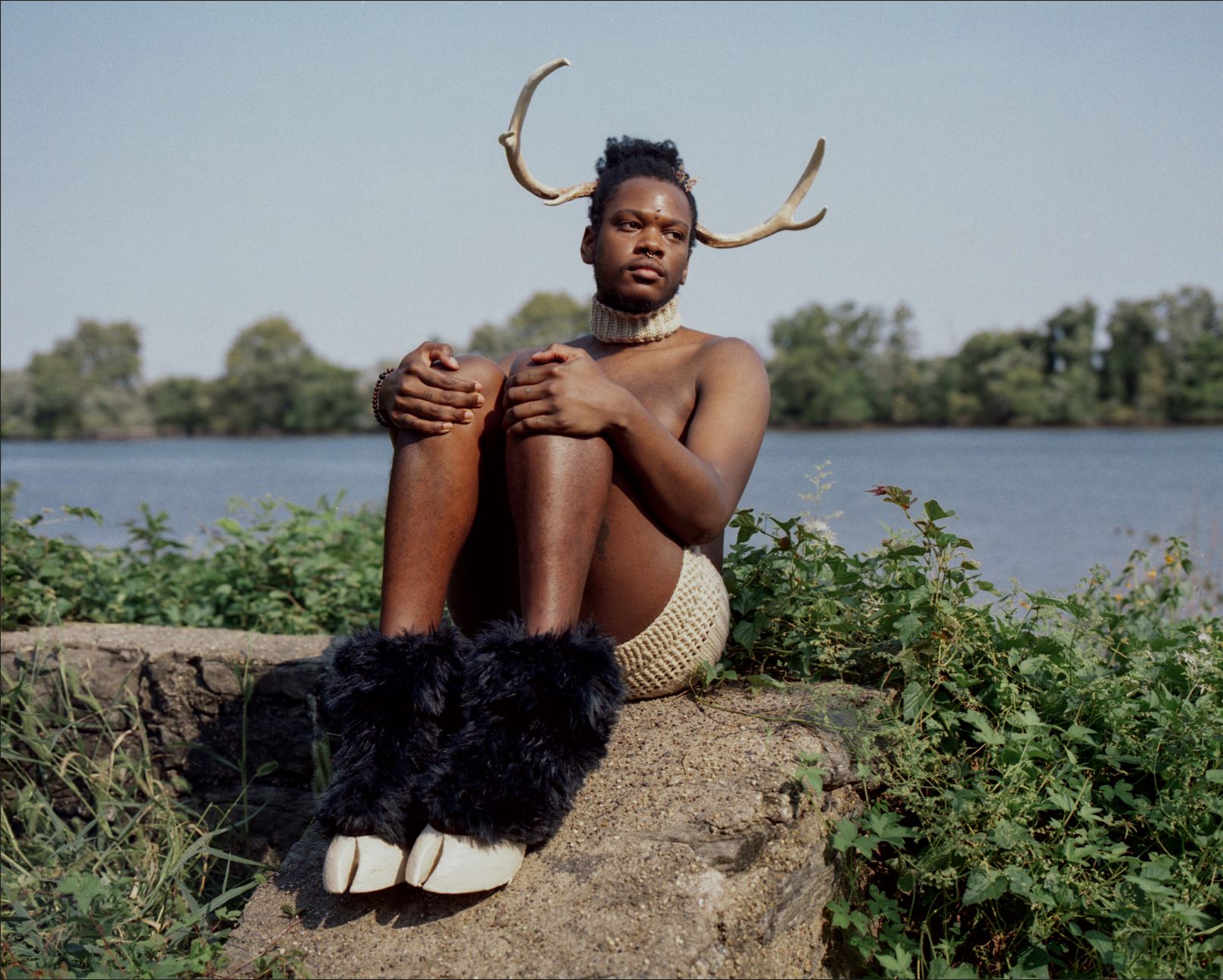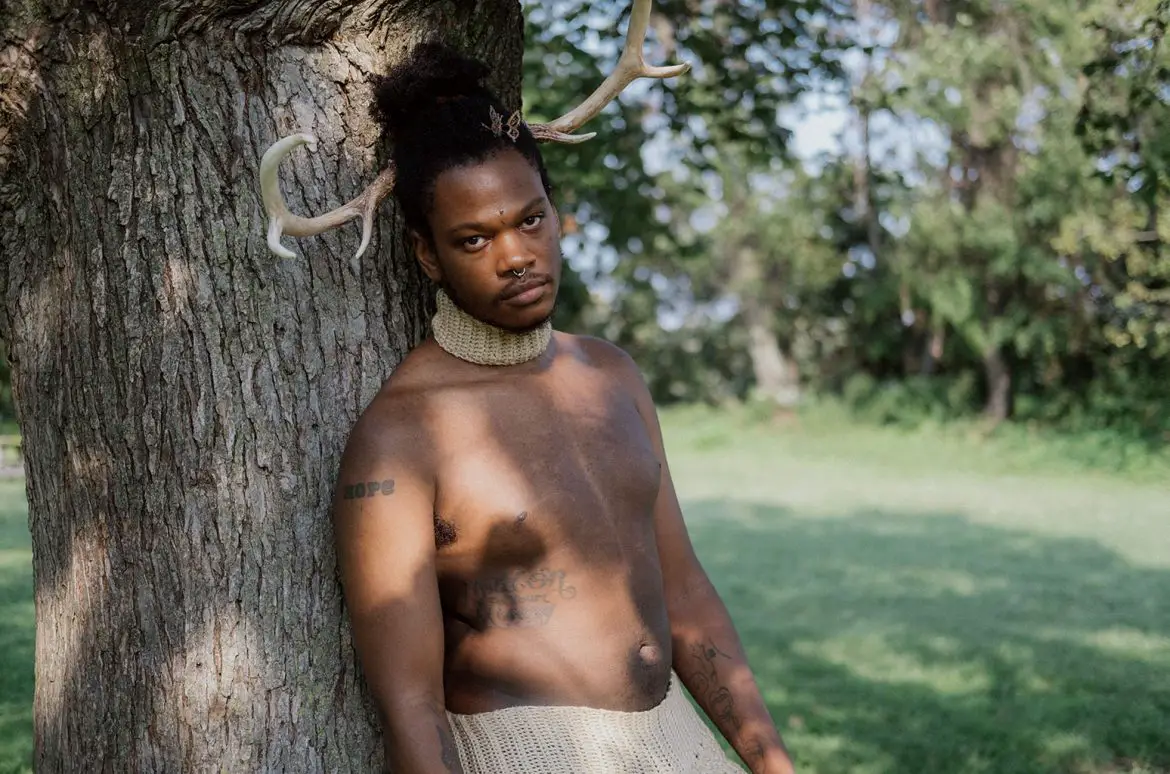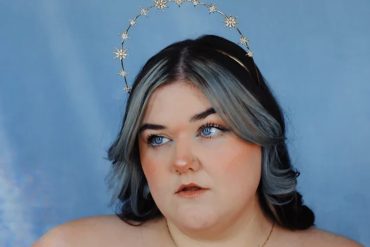The prolific Vegas-born polymath Shamir talks growing through his cosmic quarter-life crisis and rethinking what queer art really means with his genre-expansive new record ‘Heterosexuality.’
•• •• •• ••
26-year-old Shamir Bailey just might be indie’s most beloved underdog. Following the breakout success of his 2015 debut album Ratchet, he struggled against a rigid and racist music industry that could not figure out how to make his unique sense of experimentalism marketable, leading him back to his DIY roots. Writing, recording, producing, and releasing music outside of the world of labels and corporate pigeonholing, he strove to explore his artistic identity with new savvy as he reckoned with his wounds, rediscovering himself in the process. A success in risk-taking, his inimitable 2020 self-titled album was a triumph of his own determination as he showcased his masterful songwriting chops and creative versatility. With his latest record, he delves deeper into the emotional territory he carved out with Shamir, honoring his ongoing transformation as he harnesses the larger-than-life power of his own authenticity.

On his eighth record, Heterosexuality, Shamir allows himself complete nonconformity as he directly addresses his identity as a Black queer person, confronting his traumas head-on with fierce vulnerability.
As part of his transformation, he fashions himself as an androgynous deity of destruction, posing plainly as a display of the inherent beauty of his existence in the face of a transphobic, patriarchal system attempting to stifle and extinguish his flame. In doing so, he reframes this Baphomet-like figure as a mark of growth, rebirth, and resilience, in all its messiness and glory. He stands his ground as a nonbinary person on the bold “Cisgender,” where he doubly refuses genre conformity with crunchy industrial beats, atmospheric synths, distorted guitars, and his soaring vocal range. Tracks like “Gay Agenda” and “Abomination” examine queerness as an act of noncompliance at its core, extending the definition of “queer” to the refusal to comply with the white, cis capitalism that further ensures our collective oppression as a society. Even in his queerness, Shamir pioneers a brave new frontier that only he can.
Boundless and ever-surprising, Heterosexuality shows us a new possible future for indie music and artists—after all, Shamir is a key figure in the new vanguard. Averse to stasis, he’s not interested in being anything other than himself, which he is continuously expanding upon, reinventing, rediscovering. With his devotion to honesty, sonically and otherwise, he presents himself with the gift of being undefinable. It’s perhaps one of the greatest gifts of all.
— —
Listen: ‘Heterosexuality’ – Shamir
A CONVERSATION WITH SHAMIR

Atwood Magazine: First of all, congratulations on your new record!
Shamir Bailey: Thank you, I think it’s my best songwriting to date.
What constitutes strong songwriting to you?
SB: Vulnerability, but in a strategic way. [Heterosexuality] is my most vulnerable album, but I still did it in a way where I’m not just bleeding out in front of everyone because that would be terrifying for me. I made a conscious decision to offset how vulnerable it is by kind of making it open-ended. There’s no overall thing I want people to take from this record, ‘cause realistically the record is for me. You look at a song like “Cisgender” — obviously it’s an emotional, personal song for me, but it’s also very plain-stated: I’m just saying I’m not cisgender. I’m nonbinary, I’m trans. I don’t wanna be a girl, I don’t wanna be a man. It’s just stating facts. But within those lyrics, there’s a world of emotion underneath.
How did you arrive at such expansive sonic territory for Heterosexuality?
SB: That’s all Hollow Comet, Isaac [Eiger] from the band Strange Ranger. He was an angel sent to me. I love all the collaborators [who worked on my previous record], but I still had to keep that normal work guard up. With Isaac, it was the first time I ever worked with a close collaborator where I was able to be that vulnerable, but also still be productive and safe. His production was so complimentary of my songwriting—it feels like his production is hugging my songs. I really let him run with it because I trusted every single one of his instincts. He sent me some examples and sonically, I felt like I’d heard it in my dreams. I was like, “This is the song I’ve been chasing, and here it was, in me the entire time.”
It sounds like a spiritual experience almost.
SB: In a way it was, yeah. It made me realize that I love creating in nature. That was a huge thing for me. I had a slight taste of it when I shot the “Diet” video from the last record out in Tahoe, and because of COVID, I knew I wanted to record in an isolated space. I was like, ‘Yeah, let’s do nature again.’ So we went to the Poconos in February [last year], locked ourselves in a cabin, and finished recording the album. Isaac met me where I was with the songs, and everything was perfect.
Watch: “Cisgender” – Shamir
Next to your 2020 self-titled album, Heterosexuality has some of the strongest vocal performances you’ve ever recorded. How did you develop that mastery over your range?
SB: It’s been two years since I quit smoking cigarettes, but when we finished recording most of the vocals it had only been like six months. And even then, that was a huge difference. I’m a much better vocalist now, and my vocals are way more agile. And I tracked most of the vocals myself, which is a new thing that I love. At the end of the day, I’m such a bedroom artist, and tracking vocals in the studio has always been kind of a hard thing for me. Studio vocals are never my best performances. I feel like my best are always me in my room, so I was like, ‘That’s how I’m gonna approach this.’ Also, I know my mic angles now—I know how to eat the mic, basically [laughs].
I really admire the overarching theme of self-preservation you explore, especially on tracks like ''Nuclear.'' Your prioritization of yourself and your best interests is literally woven into the fabric of this record?
SB: I’m such a selfless person and I feel like a lot of people try to like frame that as a negative thing. I don’t see that as a toxic trait, I think it’s fine to be selfless. A big thing that I had to learn even before I started working on this record was how to be better at building boundaries. I think with boundaries, you are able to give more of yourself without depleting. That’s basically what the song is about—kind of in a love way, but I relate to it in a non-romantic way as well.
That’s one of the biggest lessons of the quarter-life crisis—learning how to love yourself and others.
SB: My Saturn return is technically next year, but I feel since I started writing this record last year, I’ve been in a pre-Saturn return situation. I’m in another transformational moment of my life and it’s scary. It’s terrifying, but I think now that I have this record out of me, I’m braving it better than I could have or would have if I didn’t already get these feelings out.
It's all about finding that balance between wanting someone to know you so desperately that you give all of yourself up and it is chaotic, versus not wanting to be a burden thus forgetting how to be vulnerable with others?
SB: Yeah. Distorting my likeness [on the album cover] with the horns and hooves made it easier for me to have more vulnerability in the music, ‘cause there’s a level of removal that feels comfortable. The Baphomet persona and calling the record Heterosexuality feel like boundaries where I’m able to be vulnerable.

And the Baphomet imagery obviously recalls the demonization of queerness?
SB: That’s why I focused on that specific character. I don’t consider myself an expert on the Satanic religion, but one of my best friends since childhood’s a part of the church. They’re so easily antagonized and demonized, but realistically, they don’t do anything; their views are pretty progressive. As a Black queer person, I could just be existing, minding my business, and immediately someone wants to antagonize me just because of my identity. And so that’s another reason why I empathize with the Baphomet figure in a way. It does not really represent harm, but a lot of people want to use the imagery to represent that.
Baphomet is viewed as a destroyer, but in the context of this album, that's not necessarily a bad thing. Destruction here is kind of a beautiful thing because it means there's going be a rebirth, and we have to tear everything down as we know it. That change can be really scary—not only the ways in which things become different and must be dealt with differently than before, but just the idea of change itself.
SB: There’s a death process with change. Something has to be cast off for something new to come in. That’s just the cycle of life—the death process of transformation and change is what makes it hard. Something has to die off, not even physically, but in a metaphorical sense.
And with Heterosexuality, it comes in rage and defiance. There's a lot of pain, there's a lot of trauma, but there's a leaning into it in addition to the pushback. How do you let those feelings coexist?
SB: I think self-awareness without action is useless. A lot of people really need to get that through their heads. You can be self-aware, but if you’re not taking that information and making some kind of change, you’re stagnant. There has to be a level of defiance, a level of change. That’s how I tackle my emotions and things that I go through. Once I’m able to navigate what’s going on with myself, I’m like, ‘What are actual steps that I can take to relieve this?’ I can’t just sit here with these realizations.
So much of Heterosexuality is also about simply existing as you are. This duality makes it a very nonbinary record to me.
SB: That definitely was not my explicit goal, but just by virtue of my identity, that’s kind of what it became. This record is unfortunately more isolating than I predicted it would be, and while the response to it has been very positive, it is not as broad [in its scope of relatability]. But that’s fine! If it’s not for you, it’s not for you. I’d rather hear other people who can correlate it with their identity talk about it and really understand it. That is immensely important to me. It makes me feel validated. I feel validated hearing how much you get it, you know what I mean? And that’s what I want, because I think we live such an isolating existence. I live an isolating existence. It’s kind of become a fact of life for me, so I don’t talk about it much. This record felt like a safe space for me to talk about it, and I’m glad that it’s making other people who normally feel super isolated on a day-to-day basis feel seen. I think I was searching for that in a record for myself in recent years, and I just couldn’t find it.
Watch: “Cisgender” – Shamir
Yeah. Queerness as an experience is an ongoing thing. Leaning into that part of yourself and accepting it opens us up to an interesting set of wisdoms, as if we’re unlocking new discoveries.
SB: I feel like a lot of queer artists are scared to really go there. A lot of queer art either hinges on rage or camp that errs on the side of [escapism], where it’s like, ‘Yeah, let’s disassociate, let’s have fun!’—which is fine, but not everyone identifies with that. I wanted to write somewhere in the middle. Heterosexuality is not necessarily a queer rage record. There’s definitely rage elements, but I don’t think it’s like a queer, punk, ‘I’m angry and I’m queer and I want everyone to ache like I ache!’ type of record. I just wanted to find a balance, and way to do that for me was to be as straightforward as I can be. There’s definitely other identifying qualities of, ‘Oh, this is a queer record.’ I don’t even consider “Gay Agenda” a queer song. I use [the phrase] as more of an evocative term, in the sense that anything that means individuality is the gay agenda. A [straight] man wants to wear a dress, or a man wants painted nails, and some people are like, ‘This is part of the gay agenda!’ And it’s just like, let’s think about what we’re really afraid of here. You’re afraid of individuality. You’re afraid of breaking constructs. It’s about radical acceptance, it’s not even necessarily a queer song. “Cisgender” is obviously, ‘cause it’s about my identity specifically, but I think most of the songs are very universal things, but I guess by virtue it’s queer-coded or whatever. But yeah, the song “Nuclear” is about boundaries and giving so much of yourself to the point where you depleted, and I think everyone can identify with that.
Tracks ''Stability'' and ''Marriage'' are romantic in more than one way. What is the balance between loving others versus having a romance with yourself on this record?
SB: Those two songs are dualities. “Stability” is probably the only song on the record explicitly about an ex, whereas “Marriage” is my relationship with myself, kind of like part two of “On My Own.” It’s about how the solace and the love that I find within myself is just as fulfilling. If you can’t love me as much as I love myself, then it’s not gonna work. You’re in a relationship with me and myself, you know what I mean [laughs]?
Those topics show up on ''Reproductive'' as well. I really love the line, ‘Love is meaningless in the first 25.’?
SB: That is the most lyrically dense song that I’ve written, it means a lot of things to me. It has the best line that I’ve written, ‘I hope the next life will be a reward for all the strife that I find within me, so much that it’s almost comical and at best, I’m extremely protean, and at worst, I’ll never know peace.’ That song is about generational traumas that I have to fight through, against my will. It’s a battle that I didn’t choose, and if I don’t fight it, I’m done, I’m gonna die. As dark and deep as it is, it’s true. I’m a Black queer person. Statistically, I have five years left to live. If I’m not putting my best foot forward to be as happy and healthy as I possibly can…it’s dark. I think I have to get to the point where I forgive myself that it’s not fair, but I still have to fight this fight. As exhausting as it is, I’d rather fight to be healthy and happy than lay down, sad and defeated.
— —

Connect to Shamir on
Facebook, Instagram, Twitter
Discover new music on Atwood Magazine
? © Marcus Maddox









